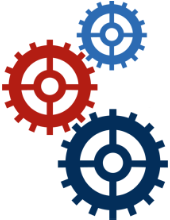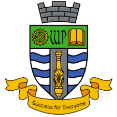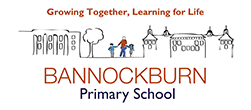Mathematics
Mathematics Curriculum Maps
Year 7 Mathematics Curriculum Map
Year 8 Mathematics Curriculum Map
Year 9 Mathematics Curriculum Map
Year 10F Mathematics Curriculum Map
Year 10H Mathematics Curriculum Map
Year 11F Mathematics Curriculum Map
Year 11H Mathematics Curriculum Map
Mathematics
Head of Department:
At the end of Key Stage 3, a successful mathematician is proficient in number, which means that he can manipulate fractions, successfully calculate with operations in the correct order, understand the importance of place value, use the basic laws of indices and understands how to use ratio and proportion. He also has a basic grasp of algebra, including algebraic notation, simple proofs and algebraic manipulation which will allow him to solve algebraic fractions. Finally, he will be able to work with 2D and 3D shapes and understand their properties, which will allow them to calculate area, perimeter, surface area and volume.
At the end of Key Stage 4, a successful mathematician will be proficient in algebra. This means that he will be successful in manipulating and solving both linear and quadratic equations and be able to understand and apply the links between equations, sequences and graphs, both linear and quadratic. He will also be able to combine his knowledge of algebra, ratio and fractions. A successful mathematician can also use the properties of both right-angled and non-right-angled triangles and circles to solve multi-step geometric problems. He will also be able to apply his knowledge of ratio and proportion to solve problems and understand exponential growth and decay. Finally, he can use his statistical knowledge to calculate and compare measures of tendency and spread and to be able to calculate the probability of both independent and independent events.
Key Stage 3 & 4
GCSE Assessment structure.
The total time for the examinations has increased, from 3 ½ hours to 4 ½ hours, which has meant three exam papers.
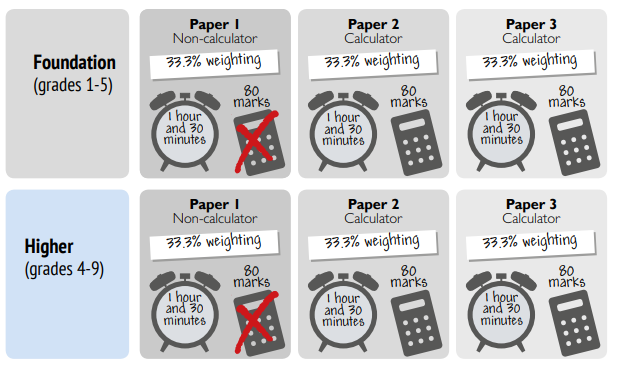
The content of our GCSE Mathematics specification has been grouped into topic areas: number; algebra; ratio, proportion and rates of change; geometry and measures, probability; statistics. However, the main thing that’s new about GCSE Mathematics is that it is more demanding for everyone:
The table below illustrates the topic areas and the weightings for both foundation and higher tiers.
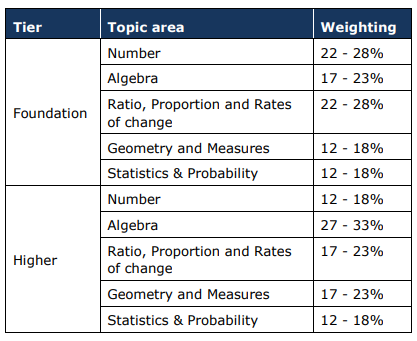
Need to Know:
Very few formulas are now given to the students in the examination paper, so students sitting their GCSE Mathematics exam need to know the formulae below and be able to use them to answer questions. Over the course of the year there will be several focused revision sessions taking place during term time on selected Saturdays and also on specified days during school holidays.
Key Stage 5
Welcome to KS5 Mathematics!
A level Maths Course Content
The Pure units are predominantly based on algebra but include some shape work and numerical methods. Pure 1 refreshes students with Higher GCSE algebra skills and develops them further.
In Pure 2 we now have a look at using advanced functions in algebra and develop towards further trigonometry.
Statistics involves handling data. It develops work at GCSE, including averages, spread, correlation and probability.
Mechanics is concerned with the mathematical models used to describe real world physical systems.
How will I learn?
We focus on developing students as independent learners; working on their ability to analyse and solve problems. They use these skills to evaluate and model solutions for situations in the real world. Throughout the course, we give students the opportunity to explore the best use of their logic and create their own personalised approach when answering a question.
Minimum Course Requirement
GCSE Mathematics Grade 7
How will I be assessed?
For those doing single Mathematics, across the two years, students will have three exam papers: Pure Mathematics 1, Pure Mathematics 2 and Statistics & Mechanics.
Which awarding body is the course validated by?
Edexcel
What qualification will I receive?
A level Mathematics
What can I do with this qualification?
Careers for mathematicians
Studying maths helps you develop skills in logical thinking, problem-solving and decision-making, which are valued by employers across many job sectors.
- Actuarial analyst
- Actuary
- Chartered Accountant
- Chartered Certfied Accountant
- Data Analyst
- Investment Analyst
- Research Scientist - Maths
- Seconday School Teacher
- Statistician
- Systems Developer
- Civil Service Fast Streamer
- Financial Manager
- Financial Trader
- Insurance Underwriter
- Meteorologist
- Operational Researcher
- Quantity Surveyor
- Software Tester
Support Materials & Useful Links
Useful websites/apps- register now:
Department Information
Any specialist equipment required?
It is essential that your child is fully equipped for every Math's lesson with a scientific calculator (we recommend CASIO Classwiz FX-85GTPLUS), a compass and a protractor, in addition to the usual equipment that they need for their other lessons.
Clubs or Interventions
Homework Club.
UKMT – prep club.
Chess Club.
Activities week activities (examples):
-
Royal Museum Greenwich
-
The British Museum
-
British Library
-
Bank of England Museum
Future careers/university courses.
Whether you plan to go on to work, A-levels (or equivalent), or other further studies, a good understanding of Mathematics will be useful. Number skills will come in handy in everyday situations, such as trying to work out whether you can afford those shoes you’re after. Learning to think like a mathematician will improve your problem-solving and decision-making skills. The Institute of Mathematics and its Applications (IMA) run an excellent website called Mathematics Careers which can be found at www.Mathematicscareers.org.uk and which demonstrates the uses of mathematics in a number of jobs and professions in areas such as Environment, Health & Society, Business & Money, Entertainment, Science & Engineering and Sport.
Mathematics is the most popular course in the Woolwich Poly Sixth form with students who gain an A level in Mathematics or Further Mathematics going on to study courses such as; actuarial science, economics, mathematics, finance, psychology, engineering, architecture, computer science, medicine and physics.
SMSC in Mathematics
Spiritual development in Mathematics
The study of mathematics enables students to make sense of the world around them, and we strive to enable each of our students to explore the connections between their numeracy skills and every-day life. Developing deep thinking and an ability to question the way in which the world works promotes the spiritual growth of students. Students are encouraged to see the sequences, patterns, symmetry and scale both in the man-made and the natural world and to use maths as a tool to explore it more fully.
Moral development in Mathematics
The moral development of students is an important thread running through the mathematics syllabus. Students are provided with opportunities to use their maths skills in real life contexts, applying and exploring the skills required in solving various problems. For example, students are encouraged to analyse data and consider the implications of misleading or biased statistical calculations. All students are made aware of the fact that the choices they make lead to various consequences. They must then make a choice that relates to the result they are looking for. The logical aspect of this relates strongly to the right/wrong responses in maths.
Social development in Mathematics
Problem-solving skills and teamwork are fundamental to mathematics through creative thinking, discussion, explaining and presenting ideas. Students are always encouraged to explain concepts to each other and support each other in their learning. In this manner, students realise their own strengths and feel a sense of achievement which often boosts confidence. Over time, they become more independent and resilient learners.
Cultural development in Mathematics
Mathematics is a universal language with a myriad of cultural inputs throughout the ages. Various approaches to mathematics from around the world are used and this provides an opportunity to discuss their origins. This includes different multiplication methods from Egypt, Russia and China, Pythagoras’ Theorem from Greece, algebra from the Middle East and debates as to where Trigonometry was first used. We try to develop an awareness of both the history of maths alongside the realisation that many topics we still learn today have travelled across the world and are used internationally.
